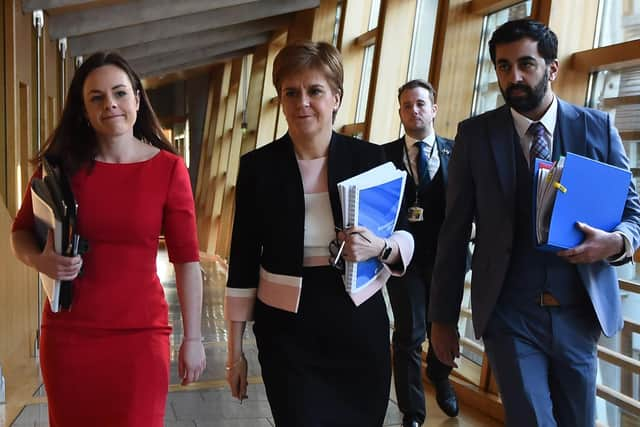SNP leadership contest: Plasticine Scottish nationalism is about to take a different shape - Euan McColm
Who can forget the independence referendum campaign of 2014 when those on the right wing of the SNP promised a land of milk and oil money while standing shoulder-to-shoulder with the anti-economic growth Greens? The don’t-scare-the-horses gradualists promising Scotland’s relationship with England would be enhanced by a Yes vote marched alongside self-styled radicals, holding their fists aloft as if cosplaying the Black Panther activism of African Americans in the 1960s.
The endlessly malleable nature of nationalism has served the SNP well over the years. So long as the central objective - the achievement of Scottish independence - remains constant, nothing else is sacred; policies may be ditched, adapted or u-turned upon in the blink of an opinion poll.
Advertisement
Hide AdAdvertisement
Hide AdTo say the SNP has changed shape throughout its history would be quite the understatement.


During the second world war, Hugh MacDiarmid - whose poem "The Little White Rose” remains compulsory reading for SNP politicians, who wear the flower during major parliamentary events - believed German invasion of Britain would be in Scotland’s interests. Since those days-that-must-not-be-mentioned, the party has slipped and slid across the political spectrum. The charge, for example, during the ‘80s that the SNP were “tartan Tories” had more than a ring of truth.
Eventually, under the leadership of Alex Salmond, the SNP anchored itself firmly in the political centre ground. Salmond may be criticised for many things but he came to understand that power is gained by winning the support of the cautious. He did not become the First SNP First Minister of Scotland by geeing-up flag waving Bravehearts but by appealing to the self-interest of middle Scotland, that small c conservative section of the population that can make or destroy political careers.
Under Salmond’s successor, Nicola Sturgeon, the SNP’s image was made-over. Her party was more radical, with “progressive” policies for for a modern democracy. The truth was, of course, that - policy-wise - nothing much changed. A tweak around the edges of income tax bands does not a revolutionary make.
But details schmetails; until a week ago, I daresay SNP activists believed they were all - the occasional difference in font, aside - on the same page.
Well, they can’t possibly think that now.
The first week of the SNP leadership contest has opened up great divisions in a party that has, for the last 20 years. been notable for its remarkable unity.
After candidate Kate Forbes, currently on maternity leave from her role as Finance Secretary, said her Christian faith would have prevented her from voting for equal marriage for gay people, all hell - unsurprisingly - broke loose. Supporters swiftly abandoned Forbes and later remarks about her belief that children should be born within wedlock did not, funnily enough, calm troubled waters.
Both Sturgeon and Deputy First Minister John Swinney deployed not-so-thinly-veiled attacks on Forbes who took a day out of the spotlight to plan a campaign reset.
Advertisement
Hide AdAdvertisement
Hide AdAll of this was a gift to challenger, Humza Yousaf who may well be a terrible Health Secretary and may have been an equally awful Justice Secretary but at least was able to proudly proclaim his support for equal marriage.
Well, up to a point…
While it is certainly true that Yousaf has said supportive things about equal marriage and that he backed the bill at its first stage, Holyrood’s records show that he did not vote for the bill at its final stage.
This, he said, was because he was on unavoidable ministerial business.
However, an intervention by former cabinet secretary Alex Neil, the man who steered the bill through parliament, left that explanation in tatters. Yousaf had, said Neil, asked to be excused from the vote on the grounds that he was under huge pressure from leading figures in Glasgow’s Muslim community to oppose equal marriage.
On Friday, Yousaf denied Neil’s account was accurate. Neil said Yousaf was “not being honest…and he knows it”.
It is, I think, always best to judge politicians on what they do rather than what they say they’ll do and there is no escaping the fact that Yousaf did not participate in the vote that finally afforded gay couples a right which had long been withheld from them.
It is entirely understandable that Kate Forbes has come under pressure for her views which have upset a great many people. But I don’t think Yousaf has earned a pass on this matter.
The third runner in this contest, Ash Regan, finally launched her campaign on Friday with a pitch to the fundamentalist wing of her party. In a rather bizarre letter to potential backers, Regan said the “referendum mechanism”: - including the plan by Nicola Sturgeon to treat the next general election as a de facto referendum - had been exhausted. Under her leadership, a majority of votes for pro-independence parties in the election would mean the start of secession talks with the UK government. Unless I was missing some microscopic nuance, this appeared to be a de facto referendum plan identical to Sturgeon’s.
Advertisement
Hide AdAdvertisement
Hide AdScottish nationalism is about to take a different shape. The choices for members are not wildly appealing. Will they be happy to mould the party around the social conservatism of Kate Forbes or will they bend it in the direction of Ash Regan’s fundamentalism?
Or will they choose to follow Humza Yousaf, a man whose politics seems to change shape depending on who he’s talking to?
Comments
Want to join the conversation? Please or to comment on this article.